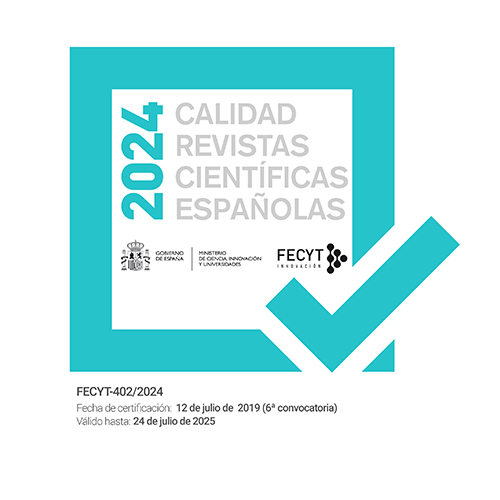Política de revisión por pares
Sobre la revista
Sobre la REDI
La Revista Española de Derecho Internacional (la REDI o la Revista), fundada en 1948, es una revista científica de gran tradición y periodicidad semestral, evaluada por pares independientes externos en un proceso de doble ciego. La REDI está afiliada a la Asociación Española de Profesores de Derecho Internacional y Relaciones Internacionales (AEPDIRI), que ejerce diversas funciones relacionadas con la Revista: (i) ostenta la titularidad; (ii) aprueba sus Directrices Generales; (ii) participa en la composición de los órganos; y (iv) conforme a la finalidad de la AEPDIRI de promover el estudio y progreso del Derecho internacional, privado y público, del Derecho de la Unión Europea y de las Relaciones Internacionales, promueve su publicación. Actualmente la REDI es editada a través de la plataforma Open Journal Systems (OJS) y publicada por Tirant lo Blanch en formato electrónico de acceso abierto a través de la página web de la Revista (https://www.revista-redi.es), pero puede imprimirse bajo demanda.
La REDI proporciona un foro de reflexión y debate académico entre juristas y politólogos de la comunidad científica española, europea e internacional, con especial atención a América Latina, y con tal fin publica trabajos, preferentemente en castellano, sobre temas relativos a Derecho internacional, privado y público, y a Relaciones internacionales, en correspondencia con el carácter multidisciplinar de la AEPDIRI. De este modo, la REDI contribuye a la construcción de conocimientos teóricos y prácticos desde una perspectiva analítica, crítica y axiológica. Se enfoca en las organizaciones e instituciones internacionales que conforman el Derecho internacional público y privado existente, y que dan forma a los eventos y contextos relevantes de las relaciones internacionales. Contribuimos así al papel que asume el Derecho internacional como promotor de la paz, la justicia y la cooperación entre la comunidad internacional con el fin último de fomentar el desarrollo económico y social, así como el mantenimiento de la paz y la seguridad internacionales.
La estructura de la REDI ha variado a lo largo de sus más de 75 años de existencia, manteniendo durante todo este tiempo una sección doctrinal (que hoy se denomina “Estudios”) y otra que incorpora recensiones o reseñas bibliográficas (“Bibliografía”). Junto a esas secciones, se incluyen actualmente un “Editorial” y, sin periodicidad fija, una sección llamada “Foro”, que recoge debates doctrinales sobre asuntos de actualidad, y otra sobre la “Práctica española”, que da continuidad de alguna forma a las “clásicas” crónicas de la práctica y la jurisprudencia españolas que durante tantos años dieron a conocer a través de la REDI la práctica y las decisiones judiciales españolas de relevancia internacional.
La REDI se rige por sus Directrices generales y otras reglas, directrices, normas y recomendaciones aplicables (por ejemplo, sobre celebración de elecciones a órganos o sobre el buen gobierno del Consejo Asesor) y todo el proceso editorial se inspira en los valores y criterios recogidos en las Directrices éticas. Está abierta a los especialistas tanto españoles como extranjeros –que pueden enviar sus trabajos adaptados a las Normas de publicación–, especialmente de la Comunidad Iberoamericana y de la Unión Europea, y, dentro de su Enfoque y ámbito, los únicos criterios determinantes para la publicación de trabajos en la REDI son su relevancia e interés, para la Revista y sus lectores, y su adecuado desarrollo científico y su calidad científica. Los autores pueden conocer las normas más detalladas sobre los requisitos o criterios formales para la publicación (Normas de publicación) y sobre el envío de trabajos (Envío de manuscritos).
Los órganos de la REDI
Dirección: Joaquín Alcaide Fernández, Universidad de Sevilla, España (jalcaide@us.es)
Secretaría Académica: Silvia Feliu Álvarez de Sotomayor, Universidad de las Islas Baleares, España (silvia.feliu@uib.es)
Consejo de Redacción:
Junto a la Dirección, la actual composición es:
- Joana Abrisketa Uriarte, Universidad de Deusto, España (joana.abrisketa@deusto.es)
- Pilar Blanco-Morales Limones, Universidad de Sevilla, España (mblancomorales@us.es)
- Miguel Gardeñes Santiago, Universidad Autónoma de Barcelona, España (miquel.gardenes@uab.cat)
- Rafael Grasa Hernández, Universidad Autónoma de Barcelona, España (rafael.grasa@uab.cat)
- José Luis Iriarte Ángel, Universidad Pública de Navarra, España (jluis.iriarte@unavarra.es)
- Enrique Martínez Pérez, Universidad de Valladolid, España (enriquejesus.martinez@uva.es)
- Leire Moure Peñín, Universidad del País Vasco, España (leire.moure@ehu.es)
- Helena Torroja Mateu, Universidad de Barcelona, España (htorroja@ub.edu)
Consejo Asesor:
- Paz Andrés Sáenz de Santa María, Universidad de Oviedo, España
- Celestino del Arenal Moyúa, Universidad Complutense de Madrid, España
- Fulvio Attinà, Universidad de Catania, Italia
- Andrea Bonomi, Universidad de Lausana, Suiza
- Jorge Cardona Lloréns, Universidad de Valencia, España
- José Carlos Fernández Rozas, Universidad Complutense de Madrid, España
- Araceli Mangas Martín, Universidad Complutense de Madrid, España
- Wagner Menezes, Universidade de São Paulo, Brasil
- Elisa Pérez Vera, Universidad Nacional de Educación a Distancia, España
- Fausto Pocar, Universidad de Milán, Italia
- Fabian Salvioli, Universidad de La Plata, Argentina
- Arlene Tickner, Académica independiente, Colombia
- Tullio R. Treves, Universidad de Milán, Italia
Las otras posiciones relacionadas con la REDI: los Evaluadores y los Redactores
Los evaluadores. La intervención de evaluadores externos en el proceso de evaluación de la calidad de los Estudios, y en su caso de las Notas, a través del método de doble ciego, se remonta, cuando menos, a la década de 1980. En la página web se publican los evaluadores que han participado en el proceso editorial de cada volumen de la Revista desde 2019.
- Evaluadores del volumen 71 (2019)
- Evaluadores del volumen 72 (2020)
- Evaluadores del volumen 73 (2021)
- Evaluadores del volumen 74 (2022)
- Evaluadores del volumen 75 (2023)
- Evaluadores del volumen 76 (2024)
Los redactores
- David Carrizo Aguado (Universidad de León, España)
- Guillem Gabriel Pizarro (Universidad Autónoma de Barcelona, España)
- Laura Movilla Pateiro (Universidad de Vigo, España)
- Montserrat Pintado Lobato (Universidad de Santiago de Compostela, España)
- Alejandro Sánchez Frías (Universidad de Málaga, España)
- Antonio Sánchez Ortega (Universidad de Granada, España)
Enfoque y ámbito de la REDI. Líneas editoriales
La Revista Española de Derecho Internacional (la REDI o la Revista) es una revista científica afiliada a la Asociación Española de Profesores de Derecho Internacional y Relaciones Internacionales (AEPDIRI o Asociación), que ostenta su titularidad y que, conforme a su finalidad de promover el estudio y progreso del Derecho internacional, privado y público, del Derecho de la Unión Europea y de las Relaciones Internacionales, promueve su publicación.
En correspondencia con el carácter multidisciplinar de la AEPDIRI, la REDI publica trabajos, preferentemente en castellano, sobre temas relativos al Derecho internacional, privado y público, y a las Relaciones internacionales, y objetos afines (Derecho transnacional, Derecho de las relaciones exteriores, etc.), proporcionando un foro de reflexión y debate académico entre juristas y politólogos de la comunidad científica española, europea e internacional, con especial atención a la comunidad de América Latina.
Dada la existencia de otras revistas de prestigio especializadas que publican también en castellano sobre el Derecho Europeo, en general, y sobre el Derecho de la Unión Europea, en particular, la Unión Europea y el Derecho material de la Unión Europea solo interesan a la REDI, en principio, en su relación con el Derecho internacional, privado y público, y las Relaciones internacionales.
De este modo, la REDI contribuye a la construcción de conocimientos teóricos y prácticos desde una perspectiva analítica, crítica y axiológica, poniendo el foco en las instituciones y organizaciones internacionales que conforman el Derecho internacional, público y privado, existente, y que dan forma a los eventos y contextos relevantes de las relaciones internacionales. Contribuye así al papel que asume el Derecho internacional como promotor de la paz, la justicia y la cooperación en la comunidad internacional con el fin último de fomentar el desarrollo económico y social sostenibles y el mantenimiento de la paz y la seguridad internacionales.
Las líneas editoriales de la REDI son:
- Las novedades normativas en Derecho internacional, público o privado, o aspectos específicos de las mismas.
- Desde el punto de vista material, cuestiones relativas a la parte general del Derecho internacional, privado o público, o cuestiones más especiales, como:
- el Derecho procesal civil internacional, el Derecho civil internacional (persona, familia, sucesiones, obligaciones contractuales y extracontractuales o bienes), el Derecho del comercio internacional o el Derecho laboral internacional;
- el Derecho relativo a las competencias espaciales (incluido el territorio de los Estados, los condominios, el Derecho del mar, el espacio ultraterrestre, etc.) y personales del Estado, la secesión y la estatalidad, las Organizaciones Internacionales, el mantenimiento de la paz y la seguridad, los derechos humanos, el Derecho internacional humanitario, el Derecho internacional económico o la protección del medio ambiente, incluidos la Agenda 2030, el cambio climático, la lucha contra el terrorismo, refugiados y migraciones, la biodiversidad y recursos genéticos marinos, etc.
- Desde la perspectiva de las fuentes, la codificación internacional o supraestatal del Derecho internacional, privado y público, en los planos tanto universal (con particular referencia, por lo que hace al Derecho internacional privado, a la Conferencia de La Haya, a UNCITRAL o a UNIDROIT), como regional, no sólo europeo (UE, Consejo de Europa, CIEC, etc.), sino de otros continentes (en especial el americano). Del mismo modo, también se valorarán los trabajos sobre la codificación estatal del Derecho internacional, privado o público, bien de manera global, bien en materias específicas relacionadas con su contenido, en especial la práctica normativa española.
- Los aspectos de Derecho internacional, privado y público, de sectores transversales o multidisciplinares tales como, entre otros, la protección de los consumidores, la protección de datos, la protección de los derechos humanos, el Derecho de la nacionalidad, el Derecho de extranjería, el Derecho de Internet o las nuevas tecnologías. Asimismo, se valorarán los trabajos sobre Derecho transnacional internacional, arreglo judicial de diferencias, arbitraje internacional u otros medios de solución alternativa de controversias o conflictos.
- Las reflexiones doctrinales acerca de la disciplina (por ejemplo, respecto de autores concretos o de escuelas científicas) y sobre la evolución histórica del Derecho internacional, privado y público.
- La aplicación del Derecho internacional público (responsabilidad, sanciones, protección diplomática, etc.)
- La perspectiva regional (asiática, africana…) del Derecho internacional y de las Relaciones internacionales
- La práctica española en materia de Derecho internacional público y de Relaciones internacionales
- Trabajos enfocados al estudio de los principales procesos y dinámicas que tiene lugar en la sociedad internacional. La temática de los estudios se centrará en la cooperación, la integración, la paz, el conflicto, no necesariamente violento, en todas sus manifestaciones, con especial interés en la nuevas formas y representaciones de estos fenómenos en el entorno internacional actual.
- Estudios de teoría de las Relaciones internacionales y de Política internacional. Se valorarán especialmente aquellos trabajos que contribuyan a profundizar críticamente en el conocimiento de los distintos enfoques teóricos o propongan innovaciones o avances para la teoría internacional y su explicación de fenómenos internacionales concretos.
- Aportaciones sobre las visiones no occidentales de las Relaciones Internacionales. Se incluirán estudios que propongan una narrativa no sustentada en visiones teóricas occidentales y contribuyan a poner en valor lógicas de pensamiento, formas de actuación internacional y propuestas de órdenes internacionales alternativos.
- Estudios sobre tendencias geopolíticas y geoeconómicas de las relaciones internacionales tanto en el ámbito regional, global o en temática concretas.
La REDI se rige por sus Directrices generales y otras reglas, directrices, normas y recomendaciones aplicables, y todo el proceso editorial se inspira en los valores y criterios recogidos en las Directrices éticas. Está abierta a los especialistas en Derecho internacional, privado y público, y Relaciones internacionales, tanto españoles como extranjeros –que pueden enviar sus trabajos adaptados a las normas de publicación–, especialmente de la Comunidad Iberoamericana y de la Unión Europea, y, dentro de su enfoque y ámbito, los únicos criterios determinantes para la publicación de trabajos en la REDI son su relevancia e interés, para la Revista y sus lectores, y su adecuado desarrollo científico y su calidad científica. La REDI proporciona un acceso abierto completo en línea para contribuir plenamente a la comunidad global de conocimiento. Los autores pueden conocer las normas más detalladas sobre los requisitos o criterios formales para la publicación (“Normas de publicación”) y sobre el envío de trabajos (“Envío de trabajos”).
La normativa de la REDI
En tanto que Revista afiliada a AEPDIRI, la REDI se rige por sus Directrices generales (adoptadas por la Junta Directiva de la AEPDIRI, a propuesta del Consejo de Redacción de la REDI, en 2018 y ratificadas por la Asamblea General en 2019, tal como han sido modificadas en 2023) y otras reglas, directrices, normas y recomendaciones aplicables, en particular: el Reglamento sobre la celebración de elecciones a los órganos de la AEPDIRI, las Directrices y normas sobre la celebración de elecciones a los Órganos de Dirección de la Revista o las Recomendaciones de buen gobierno para el Consejo Asesor de la Revista, todas aprobadas por la Asamblea General de la AEPDIRI, en 2015.
Por otra parte, todo el proceso editorial se inspira en los valores y criterios recogidos en las Directrices éticas, aplicables a todos los órganos de la REDI, autores, evaluadores y redactores, y los trabajos publicados tienen que cumplir con las Normas de publicación. Los evaluadores tienen unas Directrices de evaluación y cumplimentarán, preferentemente en el formato en línea al que accederán tras aceptar la revisión, un Formulario de evaluación.
La historia de la REDI
La REDI en sus más de 75 años de historia
El origen de la REDI se remonta a 1948, cuando se fundó en el “Instituto Francisco de Vitoria” del Consejo Superior de Investigaciones Científicas (CSIC), y desde entonces se han publicado más de cien números y setenta y cuatro volúmenes.
Entre 1948 y 1974 se sucedieron tres “épocas”: la primera, hasta 1963, bajo la dirección conjunta de Antonio de Luna y García, Fernando M.ª de Castiella y Maíz y Federico de Castro y Bravo; la “segunda etapa”, bajo la dirección de Mariano Aguilar Navarro, entre 1964 y 1968; y la tercera, bajo la dirección de Luis García Arias, entre 1969 y 1974, siendo subdirector Antonio Truyol y Serra, que tras el fallecimiento de Luis García Arias asumiría de hecho la dirección en 1973 y formalmente en 1975. En estas etapas, además de la Dirección, la REDI contó con una Secretaría y un Consejo Editorial, que tuvo un presidente y un vicepresidente entre 1969 y 1974 y que hacía las veces de los actuales Consejo de Redacción y, sobre todo, Consejo Asesor.
No obstante, durante la dirección de Mariano Aguilar Navarro se anticiparon una reestructuración orgánica (un Patronato sustituyó al Consejo Editorial y se creó un Consejo de Redacción y, además, habiendo sido Mariano Aguilar Redactor-jefe entre 1960 y 1963, en 1964 se incorporaron Redactores a la Revista) y una renovación metodológica (prestando atención a la práctica y la jurisprudencia españolas, así como a la doctrina española de los siglos XIX y XX) que, más tarde, retomaría Antonio Truyol y Serra.
La transición democrática en España y la aprobación de la Constitución española de 1978 trajeron consigo cuatro novedades para la REDI durante la “nueva etapa” bajo la dirección de Antonio Truyol y Serra (1975-1988). Estas novedades se gestaron bajo la dirección de facto ejercida por Antonio Truyol Serra tras el fallecimiento de García Arias en 1973, pero ciertamente habían sido anticipados en gran medida tras la asunción de la dirección de la REDI por Mariano Aguilar Navarro. Y en ambos casos los cambios alcanzaron a la portada de la Revista. La nueva andadura de la REDI en la España democrática supuso, en efecto, la consolidación de la reestructuración orgánica y los cambios en los contenidos de la Revista que existieron previamente entre 1964 y 1968
(i) En primer lugar, el CSIC se reestructuró y, entre otros ajustes, desapareció el "Instituto Francisco de Vitoria", en el que se incardinó hasta entonces la REDI y que sería sustituido más tarde por el "Instituto de Ciencias Jurídicas". Aunque la Revista siguió dependiendo del CSIC hasta 1996, tras la desaparición del "Instituto de Ciencias Jurídicas”, el CSIC delegó ciertas funciones relativas a la Revista en la Universidad Carlos III de Madrid (UC3M) entre 1993 y 1995, hasta que en 1995 la AEPDIRI obtuvo la cesión de la misma.
(ii) En segundo lugar, la REDI recibió el apoyo incondicional de la AEPDIRI, legalmente constituida en 1978. Ya entonces, la AEPDIRI hizo saber a la REDI su deseo de encontrar en ella un órgano de expresión, y la Dirección y el Consejo de Redacción de la Revista, al tiempo que se congratularon vivamente del nacimiento de la Asociación, agradecieron cordialmente su apoyo y brindaron gustosos las páginas de la Revista para que manifestaran en ellas su autorizada voz.
Tras la delegación de la edición y publicación de la Revista por el CSIC a la UC3M, la AEPDIRI firmó un acuerdo de colaboración a tal fin con dicha Universidad. Finalmente, tras un acuerdo tripartito entre el CSIC, la UC3M y la AEPDIRI, obtuvo la cesión de la Revista.
(iii) En tercer lugar, en 1975 se retomó el proceso de reestructuración orgánica y de renovación metodológica de la Revista llevado a cabo por Mariano Aguilar Navarro entre 1964 y 1968. De un lado, el Consejo Editorial se sustituyó de nuevo por un Patronato que, en 1987, se convertiría en el Consejo Asesor; un año después, en 1976, reapareció el Consejo de Redacción de la REDI, que ya entre 1964 y 1968 había sustituido al Consejo de Dirección y que, hasta 1987, junto a los consejeros, incluyó a la Dirección de la Revista, al redactor-jefe recuperado en 1978 para encabezar al equipo de redactores que se había incorporado a la REDI en 1964 y a la Secretaría. De otro lado, aunque no se da continuidad al interés en la doctrina española de los siglos XIX y XX (y, por tanto, no solo en los autores de la “escuela clásica”), se incluyen de nuevo en la Revista las secciones dedicadas a la práctica y, más tarde, a la jurisprudencia españolas en el campo del Derecho internacional, mientras se redujo la extensa sección bibliográfica.
(iv) Y, en cuarto lugar, se incorporan por primera vez profesoras a los órganos de la Revista. La pionera fue Elisa Pérez Vera, que ya bajo la dirección de Mariano Aguilar Navarro había publicado en la Revista (una reseña bibliográfica en el número 2 de 1965 y un estudio en el número 3 de 1965), siendo la primera mujer en pasar a formar parte del Patronato, cuando este sustituyó en 1975 al antiguo Consejo Editorial, y donde, poco después, estaría acompañada por Victoria Abellán Honrubia, que se incorporó en 1978. Otras se unirían a ese Patronato años después (Araceli Mangas Martín y Nuria Bouza Vidal, en 1986) y, más tarde, al Consejo Asesor (Blanca Vilá Costa, en 1987; Paz Andrés Sáenz de Santamaría y Lucía Millán Moro, en 1989; Alegría Borras Rodríguez y, de nuevo, Araceli Mangas Martin, en 1991; Elisa Pérez Vera, en 1998; y Paz Andrés Sáenz de Santa María, de nuevo, y Linda Silberman, en 2011). Por otra parte, Fanny Castro-Rial Garrone sería la primera mujer en ocupar la Secretaría Académica de la Revista (1980), y, en tanto que tal, la primera en formar parte del Consejo de Redacción creado a mediados de 1976. Después, han ocupado la Secretaría también Pilar Domínguez Lozano, desde entre 1991 y 1998, M.ª Ángeles Ruiz Colomé, entre 1998 y 2001, y Marta Requejo Isidro, entre 2016 y 2019. En el Consejo de Redacción, además de Fanny Castro-Rial, han participado Elisa Pérez Vera, M.ª Luisa Espada Ramos, Lucía Millán Moro, Esperanza Orihuela Calatayud, Pilar Rodríguez Mateos, Victoria Abellán Honrubia, Alegría Borras Rodríguez, Concepción Escobar Hernández, Esther Barbé Izuel, Araceli Mangas Martín, Cristina González Beilfuss, Caterina García Segura, Elena Zabalo Escudero, Irene Rodríguez Manzano, Blanca Vila Costa, Montserrat Abad Castelos, Inmaculada Marrero Rocha, Joana Abrisketa Uriarte, Helena Torroja Mateu y Leire Moure Peñín. En cambio, hubo de esperarse a 2001 para que Paz Andrés Sáenz de Santa María fuera la primera directora de la Revista, puesto en el que la sucedieron Alegría Borrás Rodríguez (2009) y Araceli Mangas Martín (2016).
Tras la progresiva desvinculación de la Revista del CSIC, a partir de 1994, bajo la dirección de Julio D. González Campos, y siempre con el impulso de la AEPDIRI, la REDI empezó a editarse y publicarse por el Boletín Oficial del Estado (BOE), hasta 2010, con la colaboración de la Universidad Carlos III de Madrid hasta 1996, y, después, bajo la dirección de Alegría Borrás, se empezó a editar y publicar por Marcial Pons, lo que se ha prolongado hasta 2022. En estos años, bajo la dirección de otros profesores de la “escuela de Oviedo de Derecho Internacional” (Luis I. Sánchez Rodríguez, entre 1998 y 2001, y Paz Andrés Sáenz de Santa María, entre 2001 y 2009, primera mujer en dirigir la Revista), de Alegría Borrás (2009–2015), de Araceli Mangas Martín (2016–2019) y de Jorge Cardona Lloréns (2020–2022), se especifica el reparto de la coordinación de cada sección de la REDI entre los miembros del Consejo de Redacción y se llevan a cabo algunos cambios motivados por la adaptación de la REDI a las exigencias de las certificaciones de calidad y las indexaciones, que se suman a la ya entonces consolidada incorporación de evaluadores externos ajenos los órganos de la Revista para la evaluación por pares mediante proceso de doble ciego: la creación de la página web y la edición también en formato electrónico con mayor accesibilidad; la internacionalización del Consejo Asesor a partir de 2012; etc. Desde 2009, la REDI fue accesible en abierto en formato electrónico a través de su página web a partir del volumen 58 (2006), con la salvedad de los dos últimos números, y desde el volumen 1 (1948) a través de suscripción a Heinonline o JStor. Desde 2023, bajo la actual dirección, la REDI es editada a través del sistema OJS (Open Journal Systems) y publicada en formato electrónico de acceso abierto e impresión bajo demanda por Tirant lo Blanch.
Galería de portadas históricas de la REDI
 |
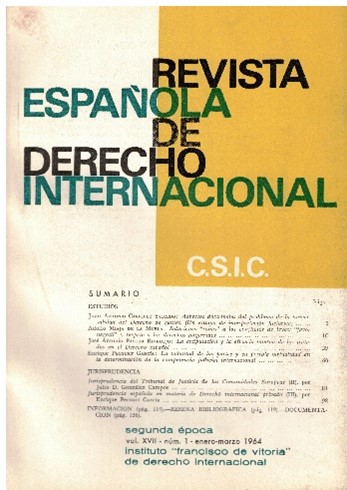 |
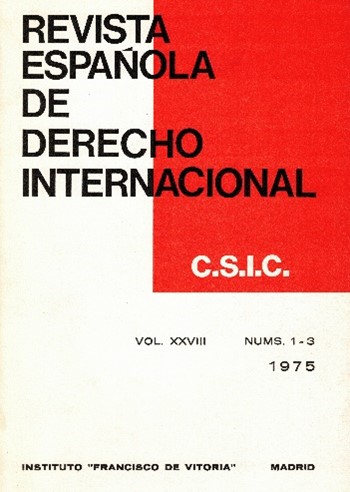 |
|
1948-1963 y 1969-1974 |
1964-1968 |
1975-1990 |
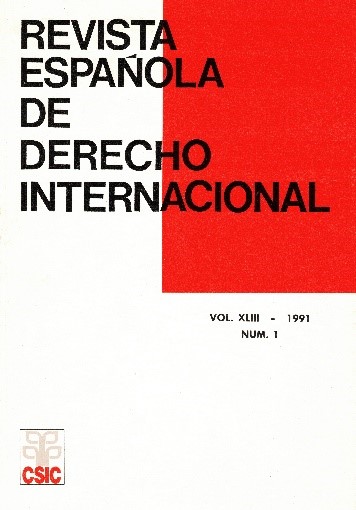 |
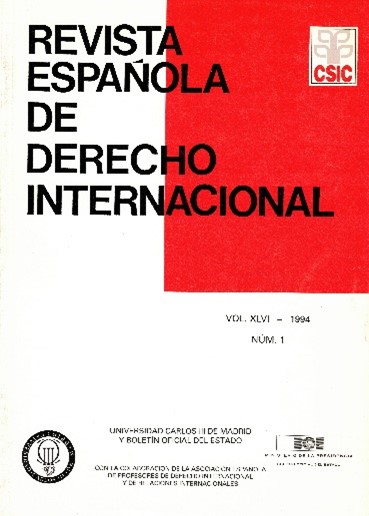 |
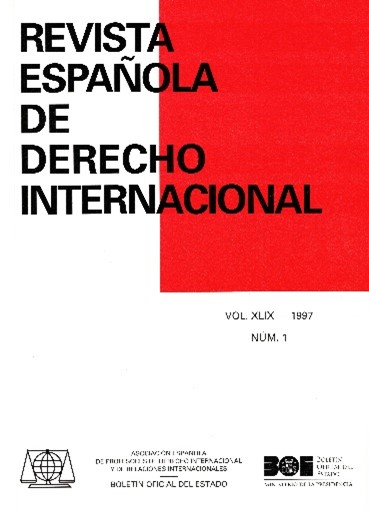 |
|
1991-1993 |
1994-1996 |
1997 |
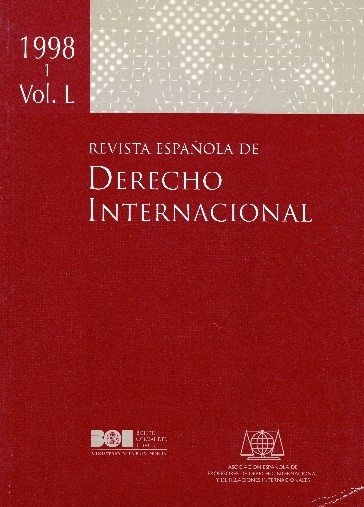 |
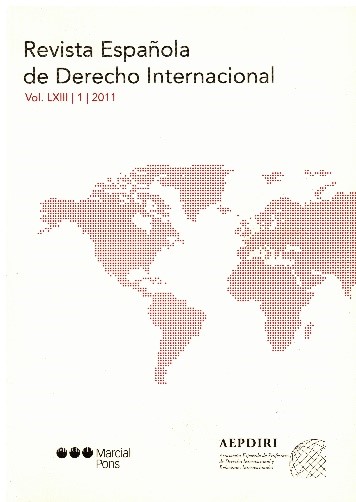 |
|
1998-2010 |
2011-2022 |
Los órganos de la REDI y otras posiciones relacionadas con la REDI desde 1948
Desde su fundación en 1948, han ejercido como órganos de la REDI: la Dirección y la Secretaría, acompañados, de un lado, de un Consejo Editorial entre 1948 y 1974, convertido en Patronato hasta 1986 y, después, desde 1987, en Consejo Asesor, y, de otro, de un Consejo de Redacción desde 1976 en adelante. Desde 1969 se incorporaron Redactores a la Revista, e incluso desde 1978 y hasta el final de la etapa de Antonio Truyol y Serra como Director, a mediados de 1988, y existió un Redactor-jefe que formaría parte del Consejo de Redacción. En el proceso editorial participarían, al menos desde la década de 1980, los Evaluadores externos.
Los anteriores Directores
- Antonio de Luna y García, Fernando M.ª de Castiella y Maíz y Federico de Castro y Bravo, de la Universidad de Madrid, que formaron un Consejo de Dirección entre 1948 y 1963, siendo el primero director del “Instituto Francisco de Vitoria” del CSIC;
- Mariano Aguilar Navarro, Universidad de Madrid (1964–1968);
- Luis García Arias, Universidad de Madrid y director del “Instituto Francisco de Vitoria” del CSIC (1969–1974), siendo subdirector Antonio Truyol y Serra, Universidad de Madrid y subdirector del Instituto, que ejerció con director tras el fallecimiento de Luis García Arias en 1973;
- Antonio Truyol y Serra, Universidad de Madrid (1975–1988);
- Julio D. González Campos, Universidad Autónoma de Madrid (1988–1997);
- Luis I. Sánchez Rodríguez, Universidad Complutense de Madrid (1998–2001);
- Paz Andrés Sáenz de Santa María, Universidad de Oviedo (2001–2009);
- Alegría Borrás, Universidad de Barcelona (2009–2015)
- Araceli Mangas Martín, Universidad Complutense de Madrid (2016–2019)
- Jorge Cardona Lloréns, Universidad de Valencia (2020–2022).
Los anteriores Secretarios Académicos
Entre 1948 y 1950, ocuparon la Secretaría Académica de la REDI, conjuntamente, César G. Fernández-Castañón y Luis García Arias, siendo el primero Secretario del “Instituto Francisco de Vitoria” del CSIC y ambos Profesores de la Universidad de Madrid. Luis García Arias siguió siendo Secretario hasta 1952, cuando ya estaba adscrito a la Universidad de Zaragoza. A continuación, ocuparon la Secretaría Académica, sucesivamente, Jesús Manuel Millaruelo Clementez, Universidad de Madrid (1953–1954), Fernando Arias Parga (1955–1958) y Álvaro Alonso-Castrillo, Letrado del Consejo de Estado (1959-1963).
Entre 1964 y 1968, durante la dirección de Mariano Aguilar Navarro, fueron Secretarios Álvaro Alonso-Castrillo y, después, Julio D. González Campos.
Entre 1969 y 1974, la Secretaría Académica la ejercieron Luciano Pereña Vicente (Universidad de La Laguna) junto con Enrique Pecourt García, durante 1969, y después, con José Luis Fernández Flores, que reemplazó a Enrique Pecourt en 1970.
Entre 1975 y 1977, el secretario sería Gregorio Garzón Clariana, sustituido en 1980, tras la momentánea desaparición del cargo en 1978-1979, por Fanny Castro-Rial Garrone. Durante 1988, asume la Secretaría Miguel Ángel Amores Conradi, hasta que es reemplazado en 1991 por Pilar Domínguez Lozano (Universidad Autónoma de Madrid), que la comparte entre 1994 y 1998 con Carlos R. Fernández Liesa (Universidad Carlos III de Madrid).
Entre 1998 y 2001, la Secretaría Académica recayó en Pedro A. de Miguel Asensio y M.ª Ángeles Ruiz Colomé (Universidad Complutense de Madrid), quedando solo el primero entre 2001 y 2009. Después sería asumida, entre 2009 y 2016, por Antonio Pastor Palomar (Universidad Rey Juan Carlos de Madrid), entre 2016 y 2019, por Marta Requejo Isidro (Universidad de Santiago de Compostela, después Max Planck Institute for Procedural Law, Luxembourg y Letrada del Tribunal de Justicia de la Unión Europea) y entre 2019 y 2023 por Josep Ibáñez Muñoz (Universidad Pompeu Fabra).
Los anteriores miembros del Consejo de Redacción (1964-1968 y 1976 en adelante)
Creado en 1964, el Consejo de Redacción estuvo compuesto originalmente por por el director de la Revista (Mariano Aguilar Navarro) y por Adolfo Miaja de la Muela, Juan Manuel Castro-Rial, Antonio Truyol y Serra, Juan Antonio Carrillo Salcedo, José Puente Egido, Luciano Pereña Vicente (Secretario del Instituto Francisco de Vitoria) y Álvaro Alonso-Castrillo (Secretario de la Revista), al que se incorporaría en 1966 Julio D. González Campos como nuevo Secretario de la Revista. Cuando Antonio Truyol recupera en 1976 el Consejo de Redacción, estuvo compuesto por el director de la Revista (Antonio Truyol y Serra), tres consejeros (Manuel Díez de Velasco Vallejo, Juan Antonio Carrillo Salcedo y Antonio Remiro Brotóns) y el secretario de la Revista (Gregorio Garzón Clariana). Durante unos años, el director y los tres consejeros simultanearon su pertenencia al Consejo de Redacción y al Patronato.
Cuando en 1978 se retoma el puesto de redactor-jefe, quien lo ocupaba formaba parte también del Consejo de Redacción, siendo el primer redactor-jefe José Antonio Pastor Ridruejo y, después, a partir de 1983, Eduardo Vilariño Pintos.
Entre 1980 y 1983 hay muchos cambios en el Consejo de Redacción: en 1980, Fanny Castro-Rial Garrone releva en la Secretaría de la Revista a Gregorio Garzón Clariana y, por tanto, en el Consejo de Redacción; en 1981, Juan Antonio Carrillo Salcedo y Antonio Remiro Brotóns dejan de formar parte del mismo y entran como consejeros Julio D. González Campos, Oriol Casanovas y la Rosa, Luis Garau Juaneda y José Olivares D’Angelo; en 1982, se une al Consejo de Redacción Primitivo Mariño Gómez; y, en 1983, salen todos los consejeros, salvo Primitivo Mariño, y son sustituidos por José Antonio Pastor Ridruejo, Elisa Pérez Vera, Gregorio Garzón Clariana, M.ª Luisa Espada Ramos y Alfonso L. Calvo Caravaca.
En 1987 se renueva el Consejo: permanece Primitivo Mariño (Instituto de Ciencias Jurídicas del CSIC) y entran Oriol Casanovas y la Rosa (Universitat Pompeu Fabra), Antonio Ortiz Arce de la Fuente (Universidad Complutense de Madrid), Luis Ignacio Sánchez Rodríguez (Universidad Complutense de Madrid), Lucía Millán Moro (Universidad de Cádiz) y Miguel Virgós Soriano (Universidad Autónoma de Madrid), que permanecen hasta 1991.
Este último año, con Julio D. González Campos ya en la dirección de la REDI, saldrían del Consejo de Redacción Oriol Casanovas y la Rosa y Antonio Ortiz Arce de la Fuente, y se incorporarían Diego J. Liñán Nogueras (Universidad de Granada), Esperanza Orihuela Calatayud (Universidad de Murcia) y Pilar Rodríguez Mateos (Universidad de Oviedo). Tras el fallecimiento de Primitivo Mariño en 1994, entraron Alfonso L. Calvo Caravaca y Fernando M. Mariño Menéndez (Universidad Carlos III de Madrid), y, al año siguiente, Victoria Abellán Honrubia (Universidad de Barcelona) y Roberto Mesa Garrido (Universidad Complutense de Madrid).
El Consejo de Redacción estuvo compuesto entre 1998 y 2001 por Francisco Aldecoa Luzárraga (Universidad del País Vasco), Celestino del Arenal Moyúa (Universidad Complutense de Madrid), Alegría Borras Rodríguez (Universidad de Barcelona), Concepción Escobar Hernández (Universidad de Cantabria), Manuel López Escudero (Universidad de Granada), Fernando M. Mariño Menéndez (Universidad Carlos III de Madrid), Andrés Rodríguez Benot (Universidad de Sevilla) y Sixto Sánchez Lorenzo (Universidad de Granada).
Entre 2001 y 2009, la composición de Consejo de Redacción fue la siguiente: hasta 2003, estuvo compuesto por Santiago Álvarez González (Universidad de Santiago de Compostela), Celestino del Arenal Moyúa, Esther Barbé Izuel (Universidad Autónoma de Barcelona), Alegría Borras Rodríguez, Concepción Escobar Hernández, Cesáreo Gutiérrez Espada (Universidad de Murcia), Araceli Mangas Martín y Sixto Sánchez Lorenzo; entre 2004 y 2008, se mantienen Santiago Álvarez González, Esther Barbé Izuel, Cesáreo Gutiérrez Espada y Araceli Mangas Martín, y se incorporan Miguel Ángel Amores Conradi, Rafael Arenas García, Antoni Pigrau Solé y José Ángel Sotillo Lorenzo; después, tras la salida de los primeros, entran Rafael Calduch Cervera (Universidad Complutense de Madrid), Cristina González Beilfuss (Universidad de Barcelona), Guillermo Palao Moreno (Universidad de Valencia) y Javier Roldán Barbero (Universidad de Granada).
A partir de 2009, siguen Rafael Calduch Cervera, Cristina González Beilfuss, Guillermo Palao Moreno y Javier Roldán Barbero, y a ellos se unen Romualdo Bermejo García (Universidad de León), Javier Diez-Hochleitner Rodríguez (Universidad Autónoma de Madrid), Caterina García Segura (Universidad Pompeu Fabra de Barcelona) y Fernando M. Mariño Menéndez (Universidad Carlos III de Madrid). En la renovación de 2012, salen Rafael Calduch Cervera, Cristina González Beilfuss, Guillermo Palao Moreno y Javier Roldán Barbero, y entran Francisco Aldecoa Luzurraga (Universidad Complutense de Madrid), Jorge Cardona Llorens (Universidad de Valencia), Joaquim J. Forner Delaygua (Universidad de Barcelona) y Elena Zabalo Escudero (Universidad de Zaragoza). En 2014 salen Romualdo Bermejo García, Javier Diez Hochleitner, Caterina García Segura y Fernando Mariño Menéndez, y entran Carlos Espósito Massicci (Universidad Autónoma de Madrid), Luis M. Hinojosa Martínez (Universidad de Granada), Irene Rodríguez Manzano (Universidad de Santiago de Compostela) y José Manuel Sobrino Heredia (Universidad de A Coruña).
En 2016 permanecen en el Consejo de Redacción, Carlos Espósito Massicci, Luis M. Hinojosa Martínez, Irene Rodríguez Manzano y José Manuel Sobrino Heredia, y entran Araceli Mangas Martín (Universidad Complutense de Madrid), José Luis de Castro (Universidad del País Vasco), Manuel Desantes Real (Universidad de Alicante), Federico F. Garau Sobrino (Universidad de las Islas Baleares) y Blanca Vilá Costa (Universidad Autónoma de Barcelona). En 2017 salen los que continuaban desde 2014 y entran Montserrat Abad Castelos (Universidad Carlos III de Madrid), Joaquín Alcaide Fernández (Universidad de Sevilla), Jaume Ferrer Lloret (Universidad de Alicante) e Inmaculada Marrero Rocha (Universidad de Granada).
En 2019 salen del Consejo de Redacción Araceli Mangas, José Luis de Castro, Manuel Desantes Real, Federico F. Garau Sobrino y Blanca Vilá Costa, y entran Joana Abrisketa Uriarte (Universidad de Deusto), Miguel Gardeñes Santiago y Rafael Grasa Hernández (Universidad Autónoma de Barcelona), Cristina González Beilfuss (Universidad de Barcelona) y Andrés Rodríguez Benot (Universidad Pablo de Olavide), en 2021 salen Montserrat Abad Castelos, Jaume Ferrer Lloret e Inmaculada Marrero Rocha. En 2023 entran como nuevos miembros del Consejo de Redacción Pilar Blanco-Morales Limones (Universidad de Sevilla), José Luis Iriarte Ángel (Universidad Pública de Navarra) y Enrique Martínez Pérez (Universidad de Valladolid), en sustitución de Jorge Cardona, Cristina González y Andrés Rodríguez, y son reelegidos Joana Abrisketa y Rafael Grasa.
Los anteriores miembros del Consejo Asesor (1987 en adelante)
El Consejo Asesor de la REDI surgió como tal en 1987, tras la conversión del antiguo Patronato que existió entre 1975 y 1986 y que, en realidad, a su vez, por su composición, vino a sustituir al antiguo Consejo Editorial que existió entre 1948 y 1974. En efecto, todos los miembros que integraban el Patronato en 1986 pasaron a formar parte en 1987 del nuevo Consejo Asesor: Luis Sela Sampil, Pedro Cortina Mauri, Juan Manuel Castro-Rial, Antonio Poch y Gutiérrez de Caviedes, Mariano Aguilar Navarro, Vicente Ramírez de Arellano, Manuel Fraga Iribarne, Alejandro Herrero Rubio, Francisco Sánchez-Apellániz Valderrama, Manuel Díez de Velasco Vallejo, Juan Antonio Carrillo Salcedo, José Puente Egido, José Antonio Pastor Ridruejo, Enrique Pecourt García, Werner Goldschmidt, Julio D. González Campos, Antonio Marín López, Manuel Medina Ortega, José Luis Fernández Flores, Elisa Pérez Vera y Oriol Casanovas y la Rosa, Antonio Remiro Brotons, Eloy Ruiloba Santana, Manuel Pérez González, Roberto Mesa Garrido, Victoria Abellán Honrubia, José Luis Iglesias Buigues, Antonio Ortiz Arce, Luis Ignacio Sánchez Rodríguez, José Carlos Fernández Rozas, Alegría Borrás Rodríguez, José María Espinar Vicente, Luis Garau Juaneda, Gregorio Garzón Clariana, Alejandro Rodríguez Carrión, Gil Carlos Rodríguez Iglesias, José Juste Ruiz, Fernando M. Mariño Menéndez, Alberto Herrero de la Fuente, Celestino del Arenal Moyua, Eduardo Vilariño Pintos, Alfonso L. Calvo Caravaca, Cesáreo Gutiérrez Espada, José Manuel Peláez Marón, Antonio F. Fernández Tomás, Antonio Pérez Voituriez, Mariano Aguilar Benítez de Lugo y Araceli Mangas Martín. Y, además, en 1987 se incorporaron Diego J. Liñán Nogueras, Blanca Vilá Costa y Jorge Pueyo Losa y, más tarde, ese mismo año, Carlos B. Jiménez Piernas y Nuria Bouza Vidal. El siguiente año se unirían José Antonio Corriente Córdoba y, ya en 1989, Paz Andrés Sáenz de Santamaría, Joan Pinyol i Rull y Lucía Millán Moro.
Desde 1991 y hasta 1998, salvo por el fallecimiento de Mariano Aguilar Navarro en 1992, el Consejo Asesor se redujo a la siguiente composición: Mariano Aguilar Navarro (Universidad Complutense de Madrid), hasta su fallecimiento, Manuel Diez de Velasco Vallejo (Universidad Complutense de Madrid), Alegría Borrás Rodríguez (Universidad de Barcelona), Carlos B. Jiménez Piernas (Universidad de Alicante), Juan Manuel Castro-Rial Canosa (Universidad Carlos III de Madrid), José Juste Ruiz (Universidad de Valencia), Araceli Mangas Martin (Universidad de Salamanca), Jorge Cardona Llorens (Universidad de Valencia) y Sixto Sánchez Lorenzo (Universidad Complutense de Madrid).
Entre 1998 y 2001, el Consejo Asesor estuvo compuesto por Juan Antonio Carrillo Salcedo (Universidad de Sevilla), Juan Manuel Castro-Rial Canosa, Manuel Díez de Velasco, José Carlos Fernández Rozas (Universidad Complutense de Madrid), Julio D. González Campos (Universidad Autónoma de Madrid), Alejandro Herrero Rubio, Antonio Marín López (Universidad de Granada), Roberto Mesa Garrido (Universidad Complutense de Madrid), José Antonio Pastor Ridruejo (Universidad Complutense de Madrid), Elisa Pérez Vera (UNED), Gil Carlos Rodríguez Iglesias (Universidad de Granada) y Antonio Truyol y Serra.
Después, entre 2001 y 2011, fallecen algunos miembros del Consejo Asesor (Antonio Marín López y Antonio Truyol y Serra, en 2003, Juan Manuel Castro-Rial Canosa, en 2005, Julio D. González Campos, en 2007, y Manuel Díez de Velasco, en 2009) y otros dejan de formar parte del mismo (Alejandro Herrero Rubio y Roberto Mesa Garrido, en 2006).
En la Asamblea General de la AEPDIRI, celebrada en Córdoba en 2011, a propuesta de la directora de la REDI y del presidente de la AEPDIRI, la Asamblea General decide la internacionalización del Consejo Asesor: junto a los integrantes que permanecían entonces (Juan Antonio Carrillo Salcedo, José Carlos Fernández Rozas, José Antonio Pastor Ridruejo, Elisa Pérez Vera y Gil Carlos Rodríguez Iglesias) y a Paz Andrés Sáenz de Santa María (Universidad de Oviedo) y Celestino del Arenal Moyúa (Universidad Complutense de Madrid), se eligieron para formar parte del Consejo Asesor a Antônio A. Cançado Trindade (Universidad de Brasilia, juez de la Corte internacional de Justicia y expresidente de la Corte Interamericana de Derechos Humanos), Fausto Pocar (Universidad de Milán y expresidente del Tribunal Penal para la Antigua Yugoslavia), Linda Silberman (Universidad de Nueva York), Christian Tomuschat (Universidad Humboldt y expresidente de la Comisión de Derecho Internacional) y Tullio R. Treves (Universidad de Milán y juez del Tribunal Internacional del Derecho del Mar). Posteriormente, el Consejo Asesor solo se modificó a causa de los fallecimientos de Juan Antonio Carrillo Salcedo en 2013 –tras cuyo fallecimiento la Asamblea de la AEPDIRI eligió a Antonio Remiro Brotóns (Universidad Autónoma de Madrid)– y de Gil Carlos Rodríguez Iglesias en 2019.
Tras la renovación hecha por la Asamblea General celebrada en Tarragona, en 2021, dejaron de ser miembros del Consejo Asesor José Antonio Pastor Ridruejo, Antônio A. Cançado Trindade, Linda Silberman, Christian Tomuschat y Antonio Remiro Brotóns.
Los miembros del antiguo Patronato (1964-1968 y 1975–1986)
El Patronato creado en 1964 estuvo compuesto por los hasta entonces miembros del Consejo de Dirección y del Consejo Editorial, designándose presidente a J. de Yanguas Messía, y solo modificado por el fallecimiento de algunos de sus miembros.
En el principio de la etapa a cuyo frente estuvo Antonio Truyol y Serra se recuperó el Patronato que, por su composición, volvió a ser una reconversión del Consejo Editorial y en 1987 se convertiría en el Consejo Asesor. Además de quienes componían el precedente Consejo Editorial, incorporaba a tres nuevos profesores, incluida Elisa Pérez Vera, que fue la primera mujer que formó parte de un Órgano de Dirección de la Revista. En concreto, el Patronato estuvo formado en 1975 por Camilo Barcia Trelles, Luis Sela Sampil, Federico de Castro y Bravo, Adolfo Miaja de la Muela, Luis Legaz y Lacambra, Fernando María Castiella Maíz, Pedro Cortina Mauri, Juan Manuel Castro-Rial, Antonio Poch y Gutiérrez de Caviedes, Mariano Aguilar Navarro, Vicente Ramírez de Arellano, Manuel Fraga Iribarne, Alejandro Herrero Rubio, Francisco Sánchez-Apellániz Valderrama, Manuel Díez de Velasco Vallejo, Juan Antonio Carrillo Salcedo, José Puente Egido, José Antonio Pastor Ridruejo, Enrique Pecourt García, Werner Goldschmidt, Julio D. González Campos, José Luis de Azcárraga y Bustamante, Antonio Marín López, Manuel Medina Ortega, José Luis Fernández Flores, Elisa Pérez Vera y Oriol Casanovas y la Rosa.
Enseguida se suceden los cambios en la composición del Patronato, en parte debido a fallecimientos (Fernando M.ª de Castiella, en 1976; Camilo Barcia Trelles, en 1977; Luis Legaz y Lacambra, en 1980; Adolfo Miaja de la Muela, en 1981; Federico de Castro y Bravo, en 1983; y José Luis de Azcárraga y Bustamante, en 1985) y en parte debido a la incorporación de nuevos profesores, además del propio Director, Antonio Truyol y Serra (Antonio Remiro Brotons y Eloy Ruiloba Santana, en 1976; Manuel Pérez González y Roberto Mesa Garrido, en 1977; Victoria Abellán Honrubia, José Luis Iglesias Buigues y Antonio Ortiz Arce, en 1978; Luis Ignacio Sánchez Rodríguez, en 1980; José Carlos Fernández Rozas, Alegría Borrás Rodríguez, José María Espinar Vicente y Luis Garau Juaneda y, después, Gregorio Garzón Clariana, Alejandro Rodríguez Carrión, Gil Carlos Rodríguez Iglesias, José Juste Ruiz, Fernando Mariño Menéndez y Alberto Herrero de la Fuente, en 1982; Celestino del Arenal Moyua y Eduardo Vilariño Pintos, en 1983; Alfonso L. Calvo Caravaca, Cesáreo Gutiérrez Espada, José Manuel Peláez Marón, Antonio F. Fernández Tomás, Antonio Pérez Voituriez, Mariano Aguilar Benítez de Lugo y Araceli Mangas Martín, en 1986).
Los que eran miembros del Patronato en 1986, junto a Diego Liñán Nogueras, Blanca Vila Costa y Jorge Pueyo Losa, compondrían en 1987 el Consejo Asesor.
Los miembros del antiguo Consejo Editorial (1948-1963 y 1968-1974)
Durante la primera época, entre 1948 y 1963, junto al Consejo de Dirección, hubo un Consejo Editorial que ejercía las funciones que actualmente ejercen el Consejo de Redacción y, sobre todo, el Consejo Asesor, creado como tal en 1987 mediante la conversión del antiguo Patronato.
El Consejo Editorial estuvo originalmente formado por Mariano Aguilar Navarro (Universidad de Sevilla), Camilo Barcia Trelles (Universidad de Santiago de Compostela), Juan Manuel Castro-Rial (Universidad de Salamanca), Pedro Cortina Mauri, Manuel Fraga Iribarne (Universidad de Valencia), Luis Gestoso Tudela (Universidad de Murcia, que permaneció en el Consejo Editorial hasta 1956), Luis Legaz y Lacambra (Universidad de Santiago de Compostela), Vicente Ramírez de Arellano (Universidad de La Laguna), José María Trías de Bes (Universidad de Barcelona, hasta su fallecimiento en 1965), Antonio Truyol y Serra (Universidad de Murcia y, después, Universidad de Madrid) y José de Yanguas Messía (Universidad de Madrid).
Después, entre 1949 y 1964, se incorporaron: Enrique Gómez Arboleya (Universidad de Madrid), Luis Sela Sampil (Universidad de Oviedo) y Alejandro Herrero Rubio Universidad de Valladolid) en 1950; Adolfo Miaja de la Muela (Universidad de Valencia ) en 1951; Luis García Arias (Universidad de Zaragoza) y Werner Goldschmidt (Universidad Tucumán), en 1953; César G. Fernández-Castañón (Universidad de Madrid), en 1955; Francisco Sánchez-Apellániz Valderrama (Universidad de La Laguna), en 1957; Joaquín Garde Castillo (Universidad de Murcia) y Antonio Poch Caviedes (Universidad de Santiago de Compostela), en 1960; y Manuel Díez de Velasco (Universidad de Barcelona), en 1963.
Cuando Luis García Arias asumió la dirección de la Revista, en 1969, el Patronato volvió a denominarse Consejo Editorial y tuvo un presidente, José de Yanguas Messía, y un vicepresidente, Camilo Barcia Trelles (Universidad de Madrid), y estuvo compuesto además por Luis Sela Sampil (Universidad de Oviedo), Federico de Castro y Bravo (Universidad de Madrid), Adolfo Miaja de la Muela (Universidad de Valencia), Luis Legaz y Lacambra (Universidad de Madrid), Fernando M.ª de Castiella y Maíz (Universidad de Madrid), Pedro Cortina Mauri, Juan Manuel Castro-Rial, Antonio Poch Gutiérrez de Caviedes (Universidad de Santiago de Compostela), Mariano Aguilar Navarro (Universidad de Madrid), Vicente Ramírez de Arellano (Universidad de Salamanca), Manuel Fraga Iribarne (Universidad de Madrid), Alejandro Herrero Rubio (Universidad de Valladolid), Francisco Sánchez-Apellániz Valderrama (Universidad de Sevilla), Manuel Díez de Velasco (Universidad de Barcelona y, después, Universidad Autónoma de Madrid), Juan Antonio Carrillo Salcedo (Universidad de Granada), José Puente Egido (Universidad de Zaragoza), y Werner Goldschmidt (Universidad de Buenos Aires). En 1970 se incorporaron José Antonio Pastor Ridruejo (Universidad de Murcia) y Enrique Pecourt García (Universidad de Salamanca), en 1971 Antonio Marín López (Universidad de Barcelona) y José Luis de Azcárraga y Bustamante (Universidad de Santiago de Compostela), y en 1972 Julio D. González Campos (Universidad de Oviedo) y Manuel Medina Ortega (Universidad Complutense de Madrid).
Los anteriores Redactores
En 1960 se nombró a Mariano Aguilar Navarro como Redactor-jefe dentro del Consejo Editorial y, precisamente este profesor, en 1964, cuando asumió la dirección de la Revista, incorporó redactores a la REDI. Entre 1978 y mediados de 1988 se recuperó el puesto de redactor-jefe, formando parte quien lo ocupaba del Consejo de Redacción; este puesto fue ocupado entonces por José Antonio Pastor Ridruejo hasta que en 1983 fue sustituido por Eduardo Vilariño Pintos.
Entre 1964 y 1968 ejercieron de Redactores, Julio D. González Campos, reemplazado por Roberto Mesa en 1966, Manuel Medina Ortega y Enrique Pecourt García. En 1969 ejercieron como redactores José Luis de Azcárraga y Bustamante, Manuel Medina Ortega, José Luis Fernández Flores y Fernando Murillo Rubiera, de la Universidad de Madrid. En los años siguientes dejan el cargo José Luis Fernández Flores (1970), José Luis de Azcárraga (1971) y Manuel Medina (1972), si bien en 1970 se incorporaron Manuel Pérez González y Alberto J. Lleonart y Amselem, de la Universidad de Madrid.
En un principio de la “nueva época” dirigida por Antonio Truyol y Serra, los redactores fueron Alberto J. Lleonart y Amselem, Luis Martínez Sanseroni, Roberto Mesa Garrido, Antonio Ortíz-Arce de la Fuente, Manuel Pérez González, Alejandro Rodríguez Carrión y Eduardo Vilariño Pintos. De estos, en 1977 salieron Roberto Mesa y Manuel Pérez, y, al año siguiente, Alberto J. Lleonart, Antonio Ortíz-Arce y Eduardo Vilariño. Este último año se unen Pedro Burgos Ródenas, Araceli Mangas Martín y Carlos B. Jiménez Piernas, y, más tarde, en 1982, Paloma Abarca Junco, Vicente Blanco Gaspar, Cesáreo Gutiérrez Espada, José Luis Iriarte de Ángel y Javier Zamora Cabot. En 1983 se renovaron todos los redactores, pasando a ejercer esa función María Isabel Castaño García, Javier Díez-Hochleitner Rodríguez, María Pilar Domínguez Lozano, Miguel de la Fuente Casamar, Carlos González de Heredia y Oñate y Mónica Guzmán Zapater. Miguel de la Fuente saldría entre 1984 y 1986, siendo sustituido por María Dolores Robredo Barrio.
En 1989 se renuevan los redactores: entran Aurelia Álvarez Rodríguez, Begoña Cerro Prado, Anabel v. Funcke, Javier González Vega, Martín C. Ortega Carcelén, José A. Perea Unceta y, un poco después, Rafael Arroyo Montero. Todos estos, salvo Begoña Cerro, permanecen entre 1991 y 1993, cuando fueron redactores también Carlos Espósito, Francisco J. Garcimartín Alferez, Jazmina Rovi, M.ª Ángeles Ruiz Colomé y Rafael Uguina Orozco. En 1994, de estos redactores solo permanecen Carlos Espósito, M.ª Ángeles Ruiz y Rafael Uguina y se incorporaron M.ª Jesús Elvira Benegas, M.ª Victoria Cuartero Rubio y Luis Peral Fernández y, meses después, Marta Kindelán y Paloma Ortiz. Entre 1996 y 1998 siguen siendo redactores C. Espósito, M.J. Elvira Benayas, M.V. Cuartero Rubio y M.A. Ruiz Colomé, a los que se suman M. Amparo Alcoceba, Alicia Cebada y Carmen Pérez González.
Entre 1998 y 2001, fueron redactores Elena Álvarez López, Elena Artuch Iriberri, Rubén Carnerero Castilla, M.ª Victoria Cuartero Rubio, Ana Gema López Martín y Diana Sancho Villa.
Desde 2001, los redactores fueron Javier González Vega, Pilar Jiménez Blanco, Patricia Orejudo Prieto de los Mozos, Enrique Rodríguez Martín, Davide de Pietri y Bernardo Fernández Pérez. En 2002, Raúl Rodríguez Magdaleno sustituyó a Enrique Rodríguez Martín, y se unieron Cristina Artero Pérez e Ignacio Rodríguez Álvarez, a los que se añadió Ángel Espiniella Menéndez en 2003. Después, en 2005, salió Cristina Artero Pérez y, en 2008, Javier A. González Vega, Ignacio Rodríguez Álvarez, Pilar Jiménez Blanco y Bernardo Fernández Pérez, mientras que ese último año se unió Andrea Aragón Álvarez.
En 2009 los redactores fueron Milagros Álvarez Verdugo, María Álvarez Torné, Georgina Garriga Suan y Laura Huici Sancho, a las que en 2012 se unió Rosa Ana Alija Fernández. En 2013 solo quedaron María Álvarez Torné y Georgina Garriga Suau.
En 2016, los redactores eran Mercedes Guinea Llorente, Patricia Orejudo Prieto de los Mozos y Francisco J. Pascual Vives, a los que se unieron ese mismo año Marta Abegón Novella y Arantxa Gandía Sellens, en 2017 María Asunción Cebrián Salvat y, a lo largo de 2018, tras la salida de Patricia Orejudo, Antonio Sánchez Ortega.
En 2020, seguían siendo redactores Marta Abegón, María Asunción Cebrián, Mercedes Guinea, Francisco J. Pascual y Antonio Sánchez, y se unió Guillem Gabriel Pizarro. Después, en 2021, salieron Marta Abegón y Francisco J. Pascual y entraron Laura Movilla Pateiro (Universidad de Santiago de Compostela) y Alejandro Sánchez Frías (Universidad de Málaga). Y en 2022 salieron Mercedes Guinea y María Asunción Cebrián, incorporándose Montserrat Pintado Lobato (Universidad de Santiago de Compostela) y David Carrizo Aguado (Universidad de León).



